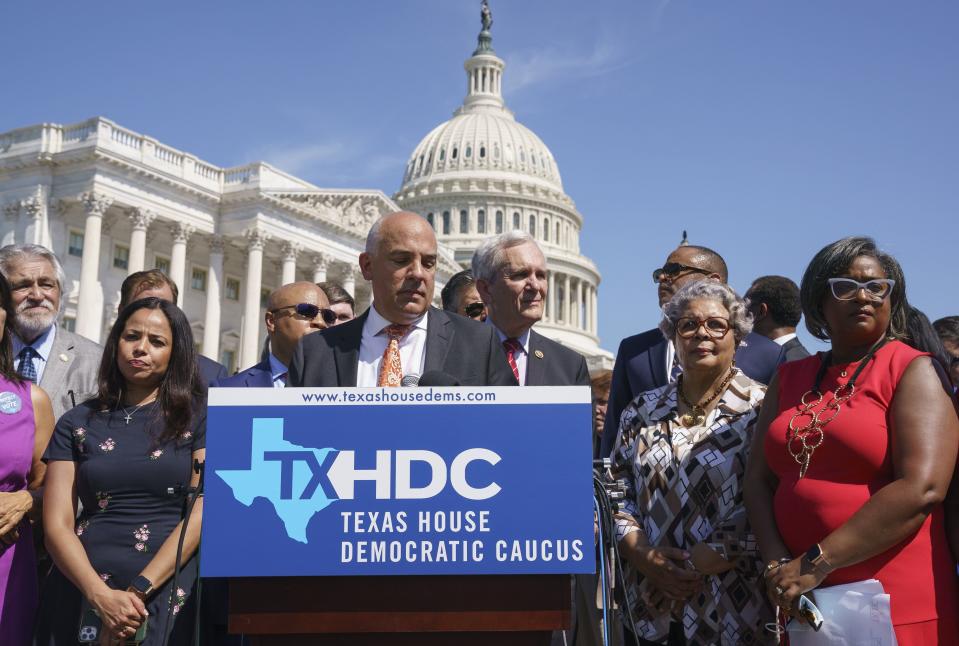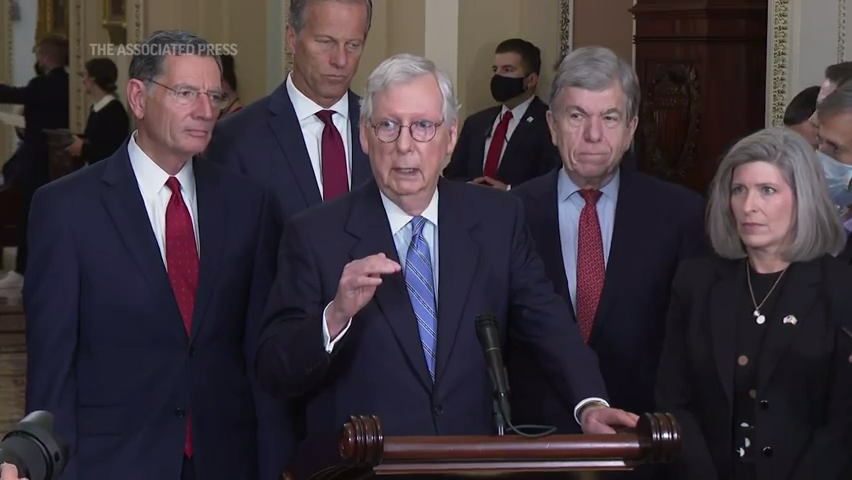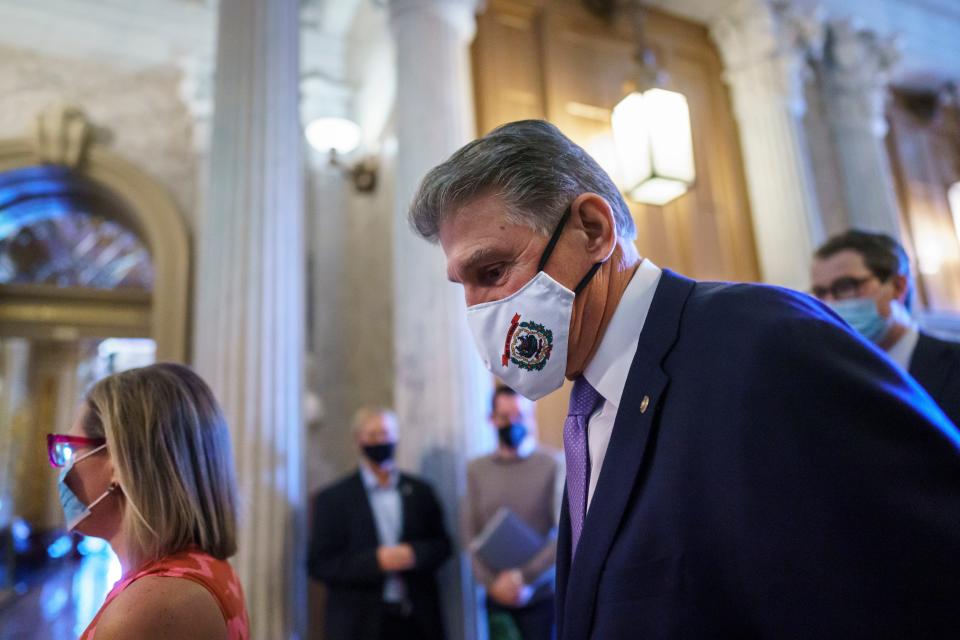Democrats put renewed focus on voting rights: What happened in 2021, and where do proposals stand now?
WASHINGTON – After a year that saw Republican-led states tightening election rules and failed congressional attempts to counter those restrictions amid more robust promotion of other priorities, Democrats in Washington have stepped into 2022 with a laser focus on voting rights legislation.
This week, they used Martin Luther King Jr. Day as the jumping-off point to take one of their most aggressive approaches yet: If they don't pass legislation to strengthen voting protections, they'll look at changing the Senate rules regarding the filibuster to get the job done.
Both efforts face long odds.
'No power whatsoever': Romney warns Dems of 2022 consequences if they change filibuster
As the issue gets a renewed attention with much of the Democrats' agenda stalled on Capitol Hill – such as their staple social spending bill known as the Build Back Better Act, which was delivered a death blow in December – here's a review of what happened last year on voting rights and lawmakers' next steps.
In 2021, GOP-led states pass restrictive voting laws
In the months after the 2020 election – which saw historic voter turnout amid a global pandemic – disputes over voting rights and election security became a central debate in statehouses across the country.
Many Republican-controlled legislatures passed voting restrictions in response to former President Donald Trump's false claims of voter fraud.
According to the Brennan Center for Justice, a nonpartisan policy group affiliated with the New York University School of Law, in 2021 at least 19 states passed 34 laws restricting access to voting.
The laws include stricter ballot signature requirements, restrictions to mail-in voting and limits on voter accommodations such as giving water to voters waiting in long lines.
More: Judge rules absentee ballot drop boxes can't be used in Wisconsin any longer
For the People Act fails
In June, Democrats in Congress first tried to pass the For the People Act, a sweeping voting rights bill that aimed at making it easier for people to vote, include expanding early voting and allowing for same-day voter registration.
The legislation was a struggle for Democrats in the Senate: They did not have a unified caucus supporting the legislation until hours before the vote to advance the bill as Sen. Joe Manchin, D-.W.Va., originally called it too partisan.
Early voting, redistricting: What's in the For the People Act?
Despite working overtime to get Manchin on board with a compromise that the Senate would take up his changes first in the legislation's debate, the bill never made it that far.
In a vote of 50-50, it fell short of the 60 votes needed to overcome a GOP filibuster. All Democratic senators voted to begin debate, and Republicans unanimously voted to block it.
More: Senate fails to advance sweeping voting rights bill aimed at expanding early voting, registration

Texas Democrats descend on DC
The heat ramped up in July as dozens Texas Democrats descended on Capitol Hill to publicly and privately lobby members of Congress on voting rights as part of an effort to stop a vote on restrictive election laws in their state.
More than 50 lawmakers – who had battled Republican Gov. Greg Abbott and the GOP-controlled Legislature in Austin for months over election changes – fled Texas to deny Republicans a quorum during a special session called to pass sweeping voting restrictions. A minimum number of lawmakers must be present to advance laws in Texas.
The Texas legislation would ban drive-thru voting or casting a ballot from inside a vehicle unless participating in curbside voting because of a disability; ban overnight voting; and boost ID requirements, among other things.
Democrats said curtailing voting access in those ways would disproportionately affect people of color.
Part of their effort also was to sway Manchin on the filibuster, but he emerged from meetings with the Texas lawmakers unmoved.
The legislation in Texas would eventually pass. In September, Abbott signed the bill into law, making good on his promise to rewrite the state's election practices despite the sharp opposition and quorum-busting walkouts from Democrats.
Freedom to Vote introduced as compromise
In September, Democrats unveiled a new elections bill, hopeful it could serve as a compromise.
The Freedom to Vote Act was more scaled back than the For the People Act but would still establish some federally mandated election rules.
More: Senate Democrats unveil new voting rights bill in latest effort to bring federal rules to elections
Manchin, who was skeptical of the sweeping nature of the For the People Act, threw his support behind the Freedom to Vote Act and tried to court Republicans to support the legislation. They remained unmoved from their opposition to federal election security legislation.
Republicans have largely maintained that sweeping changes at the federal level are overreach, and it should be up to the states on how they run their elections.

Senate Minority Leader Mitch McConnell of Kentucky, called the Freedom to Vote Act a federal "election takeover scheme."
In October, Senate Republicans blocked the vote to advance the legislation to debate.
Voting rights and election reform: Senate Republicans block latest legislation
Focus shifts to legislation named for John Lewis
In November, attention flipped to another piece of voting rights legislation: the John Lewis Voting Rights Advancement Act, named for the late Georgia Democratic representative and civil rights icon.
The bill aims to restore Justice Department review of changes in election law in states with a history of discrimination.
Democrats were able to get one GOP senator to support debate on the legislation: Lisa Murkowski of Alaska. Speaking from the Senate floor before that vote, she said that while she had reservations about the bill, she believed it was the best starting point to begin debating voting rights legislation.
But still, the legislation failed to advance without nine of her GOP colleagues joining to overcome the filibuster.
More: Republicans block John Lewis Voting Rights Act in Senate vote
December and January: Democrats pivot to voting rights
In the second half of 2021, Democrats had focused all their energy on getting Biden's Build Back Better social safety net legislation through Congress. When that effort failed in December, almost immediately Biden and Democratic leadership pivoted, making clear their focus for the beginning of 2022 was addressing voting rights.
The change came amid pressure from progressives and activists on the White House to be more aggressive on an issue they view as critical ahead of November's midterm elections.
Ahead of the one-year anniversary of the Jan. 6 2021, Capitol riot,, Senate Majority Leader Chuck Schumer, D-N.Y., stressed the need to address voting rights in a letter to colleagues.
More: ‘This is insane.’ Lawmakers relive Jan. 6 horror alongside fresh trauma of effort to rewrite history
Schumer said: "The attacks on our democracy have not ceased. In fact, they have only accelerated.
"Much like the violent insurrectionists who stormed the US Capitol nearly one year ago, Republican officials in states across the country have seized on the former president’s Big Lie about widespread voter fraud to enact anti-democratic legislation and seize control of typically non-partisan election administration functions," he wrote, setting a deadline of Martin Luther King Jr. Day to vote on the issue.

Biden also made a series of speeches on the question, part of a full-throated effort by Democrats to muscle the voting rights bills through Congress. This month in Atlanta, the president gave a passionate speech, saying the passage of voting rights legislation "will mark a turning point in this nation's history."
He also said it was Republicans' "endgame" to "turn the will of the voters into a mere suggestion.”
Schumer's MLK deadline passes. What happens next?
Schumer missed his self-imposed deadline to advance voting rights legislation by MLK Day.
The House passed a bill last week that combined the John Lewis Voting Rights Advancement Act and the Freedom to Vote Act and sent it to the Senate for a vote. Because of the House process used to approve that legislation, the Senate was able to begin debate Tuesday without any Republican support.
It wasn't lack of support from the Democratic caucus but COVID-19 that threw a wrench in the plan to delay the debate by a few days and again highlighted the razor-thin margin Democrats have in a 50-50 Senate, where Vice President Kamala Harris has been the tiebreaking vote.
On Thursday, Sen. Brian Schatz, D-Hawaii, announced he had COVID-19, meaning that while he quarantined, the majority would not have the 50 votes needed to proceed to debate on the legislation.
The action on the Senate floor largely took place Tuesday, and the Senate debated voting rights legislation for the first time this Congress. However, the legislation's future is dim.
More: As voting rights push fizzles, Biden's failure to unite his own party looms again
Debate is expected to end Wednesday or Thursday, though the bill will not move forward because of the lack of Republican support.
When the legislation is inevitably blocked by Senate Republicans, Schumer said the upper chamber will vote to change the filibuster to pass the legislation.
Renewed push to address filibuster
Without 10 Republicans joining all 50 Democratic senators, voting rights legislation will not pass because of Senate rules as they stand.
Schumer has used the events that happened a year ago on Jan. 6 to stress the importance of addressing the filibuster.
"Let me be clear: January 6th was a symptom of a broader illness – an effort to delegitimize our election process, and the Senate must advance systemic democracy reforms to repair our republic or else the events of that day will not be an aberration, they will be the new norm," he said.
Calls for change are being echoed in the White House.
'Let the majority prevail': Biden backs filibuster change to pass voting rights in Atlanta speech
Biden, who served 36 years as a senator from Delaware, had defended the filibuster in the past. But he has changed his tune, saying he would support revising the rules to exempt voting rights bills from the filibuster because Republicans have abused the process and "because the threat to our democracy is so grave."
"Let the majority prevail," he said at the Atlanta University Center Consortium on the grounds of Clark Atlanta University and Morehouse College. "Today, I'm making it clear, to protect our democracy, I support changing the Senate rules, whichever way they need to be changed, to prevent a minority of senators from blocking action on voting rights."
Democrats could change the filibuster if they had complete unity from their caucus. But Manchin and Sen. Kyrsten Sinema, D-Ariz., staunchly support the Senate rule, both arguing it is important to protect the power of the minority in the upper chamber.
Even after Biden attended a Senate Democratic Caucus lunch Thursday to discuss the push to pass voting rights and potential changes to the Senate rules, neither senator was moved to change their stance.

In fact, Sinema spoke even before Biden arrived up on Capitol Hill, saying from the Senate floor for a crowd of her GOP colleagues that “eliminating the 60-vote threshold will simply guarantee that we lose a critical tool that we need to safeguard our democracy from threats in the years to come."
Despite the more aggressive push from Democrats across Washington to address the issue, it is unlikely significant change happens beyond that: Republicans will block passage of the bill, and Democrats will not have the votes to change the filibuster.
This article originally appeared on USA TODAY: Voting rights bill: Why reforms didn't pass in 2021 and what's next

 Yahoo Movies
Yahoo Movies 
